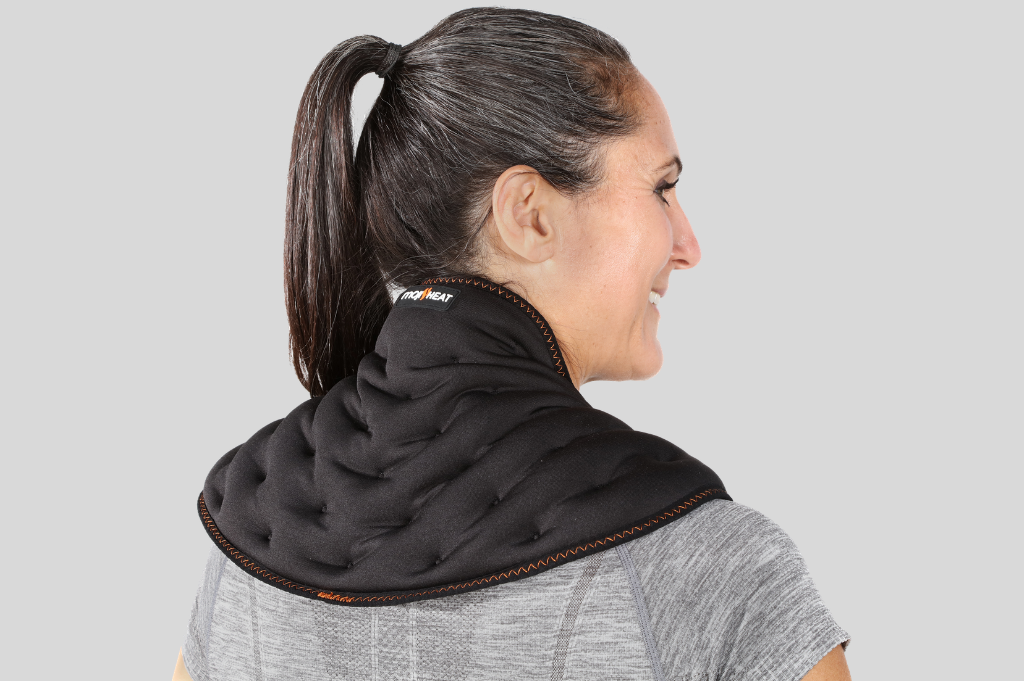If you’ve experienced neck pain or a stiff neck, you know how painful it can be and how much it can limit your daily activities. Thankfully, most neck pain isn’t permanent and neck pain treatments can be done in the comfort of your own home with a heated neck wrap, rest, and gentle stretching. Below you’ll learn some of the main causes of neck pain and how to get rid of a stiff neck with our top tips for neck pain treatment.
Common Causes of Neck Pain
If turning your head gently from side to side is difficult or painful, you may be suffering from a stiff neck. This type of neck pain may also result in headaches, shoulder pain, or even pain that radiates down the arm if you have a pinched nerve. Although painful, neck pain on its own is not a major cause for concern. However, combined with other serious symptoms, a stiff neck could be an indicator of a much bigger problem and you should consult a physician immediately. Here are some common causes of neck pain and how to identify if your situation requires further treatment.
1. Disorders
The cervical spine encompasses all of the bones, joints, muscles, and nerves in your neck, and your spinal cord runs right down the center of it all. Age, injury, or wear to any of these components can lead to disorders that cause you to have a stiff neck. Disorders with spinal nerves, bones, joints, or muscles can also lead to neurological problems and intense pain. Some of the most common cervical spine disorders are listed below.
- Cervical Disc Problems—Spinal discs cushion your vertebrate, but as you age they can herniate or degenerate. If they do, they can irritate nerve roots resulting in a stiff neck or pain in your shoulders, arms, and/or hands.
- Spinal Stenosis—This often develops at the same time as spinal osteoarthritis and occurs when facet joints in your spine get close to spinal nerve roots or actually get into the spinal cord area. As you can imagine it can result in a stiff neck, difficulty walking, and arm pain or tingling.
Spinal disorders should always be treated by medical professionals, even if you don’t have severe symptoms. Disorders with the cervical spine tend to get worse over time and getting the right medical care early on can help prevent or slow down future damage.
2. Strains
When you do repetitive tasks or have bad posture for extended periods of time you put additional strain on your neck that can cause neck spasms or a stiff neck from tight muscles. Some of these activities involve holding your phone between your head and shoulder when making calls, looking down at your computer at work, carrying heavy bags on only one shoulder, and sleeping with your neck at a bad angle. Looking down for long periods of time can lead to what is referred to as “text neck” because so many people get a sore neck from looking down at their smartphones.
3. Infections
Although uncommon, a stiff neck can be caused by a serious infection like meningococcal disease. If your neck pain has any of the following accompanying symptoms, be sure to contact your physician immediately.
- Headache
- Fever
- Coordination issues
- Vomiting or nausea
- Weight loss
- Fatigue
- Mental changes
In the case of infection, at least one of these other symptoms will appear slightly before you get a stiff neck or around the same time it occurs. If you do have any of these additional symptoms it’s important to seek medical help immediately to determine the cause of your neck pain, but it does not necessarily mean you have a serious medical condition.
Neck Pain Treatment
Thankfully, most of the time a stiff neck is not serious and will heal on its own after a few days. While it does take time to see improvements to a stiff neck, there are things you can do to speed up the healing process. Some of the most common neck pain treatments include:
- Rest—This is one of the most important neck pain treatments you can do for your body when you have a stiff neck. In order for your body to fully heal, you must take some time to rest. Avoid doing anything that will stress your stiff neck further, and be sure to get some good sleep. It’s also important not to rest for too long. Don’t take more than a day or two or the inactivity may weaken your neck muscles.
- Use a Heated Neck Wrap—Heat increases blood flow to your neck and can help speed up the healing process. Apply a heated neck wrap for 15-20 minutes at a time and let yourself relax.
- Stretching—Don’t jump into stretching right after you’ve developed a stiff neck or you could do more harm than good. However, gentle stretches can help you get a better range of motion while you’re recovering from neck pain.
- Low-Impact Exercises—Stretching and even walking can help you recover faster because it improves blood flow and encourages oxygen circulation that speeds up the healing process.
- Medicine—Over-the-counter medication is sufficient for most people doing neck pain treatment at home. Some common anti-inflammatory drugs include ibuprofen and naproxen. Read over the side effects and dosage before you use them.
There are many neck pain treatment options, and many people use a combination of them to improve their stiff neck.
Lower Your Risk of a Stiff Neck in the Future
Once you’ve recovered from your stiff neck you’ll likely want to avoid any future relapses—if possible. You can lower your chances of having neck pain in the future by doing a few simple things.
Strengthen Your Neck
Strong neck muscles have an easier time supporting the weight of your head, as well as help you to maintain better posture—and they tend not to get stiff or spasm as often. You might consider working with a physical therapist to develop some neck strengthening exercises for your neck.
Have Good Posture
Your posture can significantly impact whether you get a stiff neck or not. Many people work in job positions where they sit at a computer and look down at a screen all day long, others have physically demanding jobs that require lifting heavy objects, which places a lot of strain on their spine. There are some things you can do to improve your posture no matter what kind of work environment you find yourself in.
If you lift heavy objects at your job, make sure you are lifting with your legs and not your back to avoid injury. For office workers, your workstation can do a lot to improve your posture. Don’t slouch at your desk and make sure your computer monitor is positioned so you can look straight ahead (and not down) at the screen while you work.
Heated Neck Wraps
One of the best ways to relax the muscles in your neck and get pain relief from a stiff neck is to use a heated neck wrap. A heated neck wrap offers relief from stiffness, spasms, pain, and can even be used to help you warm up before playing sports or other activities. For safety reasons, you should limit your use to 15-20 minutes at a time. They are a great, drug-free way to get neck pain treatment.
The Moji heated neck wrap has no cords or water to worry about and is a mess-free way of getting targeted heat relief to your neck and shoulders. You can even adjust the pressure on your neck with heated hand straps. Heated neck wraps are one of the best ways to treat a stiff neck, and knowing how to get rid of a stiff neck will help you treat neck pain quickly when it rears its ugly head.

